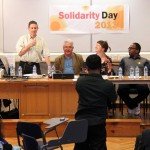The success of last Saturday’s Solidarity Day has been widely reported, both in Britain and internationally. Organised by Tamil Solidarity and the British Tamils Forum it was a platform to highlight the links being built between the Tamil community and trade unions in Britain, and with other community-based campaigns.
The trade unions are of particular importance because they organise six million working people throughout Britain. They are active in both the public and private sector. In every hospital, school and college, local council and utility company, and on public transport, members of a trade union are present, delivering the public services we all rely on. In factories, offices and retail outlets, too, you will find trade union members.
The collective strength of those working people, through the trade union movement, means that they can organise to improve working conditions and pay, and to defend important public services.
It is also a source of great potential support for workers and oppressed people around the world. As the Tamil Solidarity campaign spreads awareness of the plight of Tamil-speaking people in Sri Lanka into the trade unions they, in turn, can add their voice to the campaign for Tamils’ rights.
In the short term, that means adding their voices to the demand to reverse the decision to hold the Commonwealth Heads of Government Meeting in Sri Lanka in November. And to demand, if it does go ahead, that prime minister David Cameron and prince Charles should not attend.
It also means taking up our other demands, such as the need for a genuinely independent investigation into all the war crimes of the recent conflict. Such an investigation would have to be made up of representatives of the communities affected, and could receive assistance from the workers’ movement and human rights organisations internationally.
The Solidarity Day was also significant for a number of other reasons.
Join the union campaign: A large proportion of the 300,000 Tamil-speaking people living in Britain work in the public sector or in the lower-paid sections of the private sector. Joining a trade union, and becoming active in the union movement, would help them win significant improvements in working conditions and pay.
Not only that. Most Tamils live in the poorer, working-class areas of towns and cities, which rely on the essential public services provided, in the main, by trade union members. With the current deep cutbacks to public services being driven by the Con-Dem coalition government, by participating in local anti-cuts campaigns, communities can help defend these services.
Stop Bodu Bala Sena: Firasul Fouz, Tamil Solidarity national coordinating committee member, highlighted this important campaign at the Solidarity Day. The regime of president Mahinda Rajapaksa is whipping up Sinhala-nationalist feeling to shore up his support. It is an attempt at cynical divide and rule.
In the process, the regime has given the green light to groups such as Bodu Bala Sena, a far-right Sinhala/Buddhist organisation. It has been responsible for attacks on Tamil Muslims in Sri Lanka, and puts forward an aggressive ideology claiming Sri Lanka exclusively for Sinhala Buddhists.
As Fouz explained very clearly, this is an extremely dangerous development, not only for the Tamils being physically attacked but also for the majority of Sinhala people. The policies of Rajapaksa have included deep attacks on public services, job cuts and huge price rises for rice, fuel and other essential goods. Coupled with the continued attack on democratic rights, these have affected all working and poor people in Sri Lanka, regardless of their religious or ethnic origins.
At a time when Sinhala trade union activists are beginning to rise up in ever greater numbers against these policies, the need for a united struggle against the Rajapaksa regime is more urgent than ever. Divisive, reactionary, right-wing groups such as Bodu Bala Sena must be stopped – for everyone’s sake.
International solidarity: Speakers from other international campaigns participated in the Solidarity Day. The Day-Mer Turkish/Kurdish community organisation reported on the latest developments in the battles against harsh police repression of the movement in Turkey. The situation in Nepal, a small country squeezed between India and China, was reported on, too.
Along with the trade unions and workers’ movement, other oppressed people are the natural allies of the Tamils. Linking together can only strengthen us all.
Other campaigns: The Solidarity Day also heard from Youth Fight for Jobs and Education, a campaign backed by seven national trade unions – PCS (civil service), RMT (transport), CWU (communications), Unite (general), UCU (lecturers), TSSA (transport). This takes up the rights of young people, including for decent education, training and jobs.
The Rape is No Joke campaign was represented by Claire Laker-Mansfield, who made the important link between the way Tamil women were abused at the end of the war and in the detention camps with the rape cases in India and women’s rights more generally.
The initiative to bring together all of these campaigns was an important step forward. But it was just the start.
We will continue to build on the links that were made last Saturday.
We will organise further Solidarity Days in the future. And we will aim to make them even more inclusive, with time for more discussion and debate – to strengthen the struggle of the Tamils and all workers and oppressed in Sri Lanka, and around the world.

















